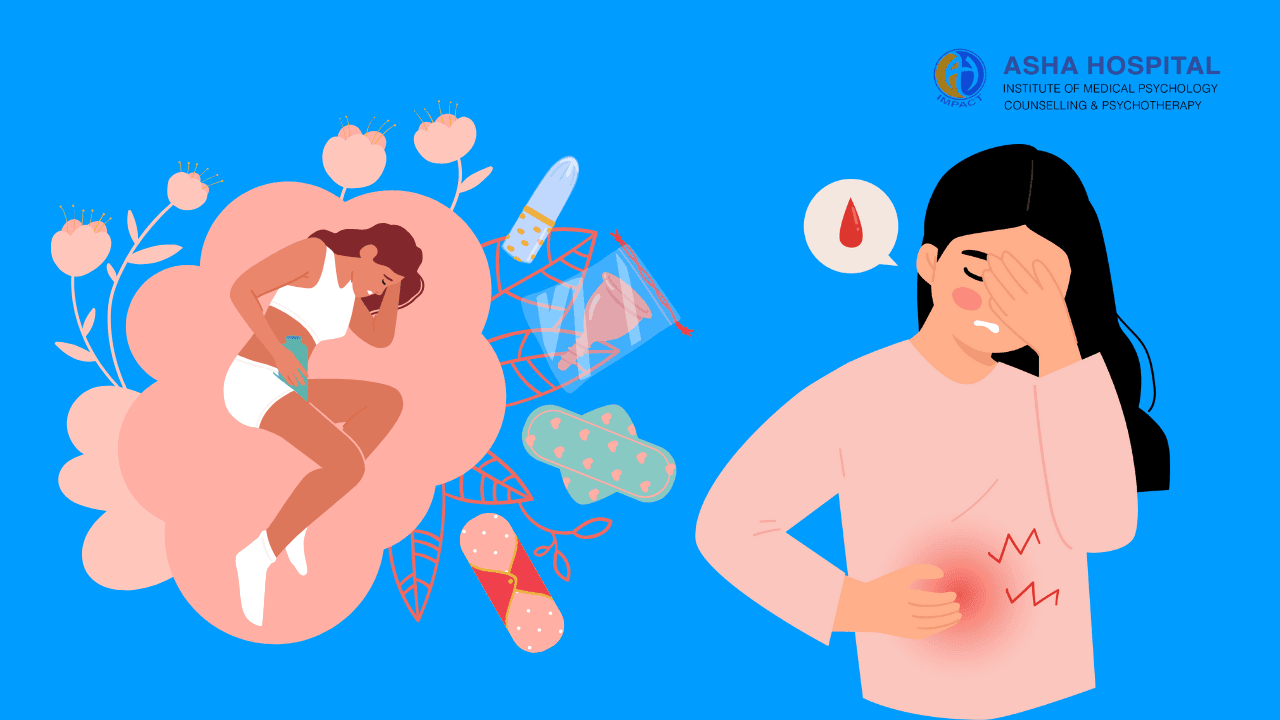Women in their reproductive years experience transient mood and physical changes just before or during their menstruation. Most often, they experience only mild discomfort, and symptoms do not interfere with their personal, social, or professional lives; however, 5% to 8% of women have moderate-to-severe symptoms that can cause significant distress and functional impairment.
PMDD is in part attributable to luteal phase abnormalities in seretonergic activity. Deficiencies of certain vitamins and minerals including vitamin D, Vitamin B, calcium and magnesium also play a major role.

Premenstrual Syndrome (PMS)
Women often experience emotional, physical and behavioural symptoms, occurs 1-2 weeks before the onset of Menstruation (period) and remits with the onset of menses. Around 3-8% of women experience PMS, disturbing their functioning
Psychological Symptoms
- Anger
- Anxiety/ nervousness/ feeling tensed
- Depression/ low mood/ lack of interest
- Sensitivity to rejection
- Social withdrawal
Physical Symptoms
- Abdominal bloating
- Increased appetite, craving for sweets and soft food
- Breast tenderness/ heaviness
- Headaches
- Fatigability
- Muscle aches
- Excessive sleepiness
- Water retention in extremities (feet)
Behavioral Symptoms
- Impaired concentration
- Forgetfulness
- Aggressive/ irritable
Pre Menstrual Dysphoric Disorder
It is a severe form of PMS, characterized with significant mood disturbance, irritability, emerge within 1-2 weeks preceding menstruation and resolve with onset of menses. PMDD affects 3-8% of women in their reproductive years, starts in their second decade and worsens as they enter menopause. PMDD causes significant interference in women social, personal and work life causing significant disturbance in maintaining interpersonal relationships and work performance.
Receptors for estrogen and progesterone are present in the areas of the brain involves with emotions and cognition such as amygdale and hippocampus. They also affect the receptors that modulate GABA, serotonin, dopamine and NMDA. Estrogen fluctuations across the menstrual cycle alter the mood response to psychosocial stress
Mood disorders such as PMDD and BD can worsen during premenstrual period, thus may mimic PMDD, which we call as Premenstrual exacerbation.
Mood
- Feeling sad, depressed, hopeless, worthless
- Marked mood lability like mood swings; suddenly feeling sad or tearful
- Increased irritability and or anger; frequent conflicts with family members or at work
- Increased anxiety or the feeling of being on edge all the time
- Lack of energy, fatigability
- Decreased interest in normal activities
- Problems with concentration
- Changes in appetite, either overeating or craving a specific food
- Changes in sleep pattern, either hypersomnia or insomnia
- Feeling overwhelmed or out of control
Somatic
- Breast swelling or tenderness
- Joint or muscle aches
- A sensation of bloating or weight gain
- Headaches
PMDD Assessment Scales
- Premenstrual Symptom Screening Tool (PSST)
- Calendar of Premenstrual Experiences (COPE)
- Visual Analogue Scale (VAS)
- Daily Record of Severity of Problems (DRSP)
- Patient Reported Outcomes Measurement Information System (PROMIS)
- Prospective Record of the Severity of Menstruation (PRISM)
PMS or PMDD Management
After the diagnosis of PMS or PMDD has been made through exclusion of other medical and psychiatric conditions, as well as by prospective daily ratings of symptoms, treatment can be initiated.
SSRI are the first line treatment for moderate to severe PMDD. These medications can be dosed on a continuous or intermittent schedule depending on severity of her symptoms. For severe symptoms, that fail two trails of SRI medications, combined hormonal contraceptive pills and copper intrauterine devices and medications that suppress ovulation, such as a GnRH agonist, may be considered.
Surgical removal of the uterus, fallopian tubes and ovaries may also be considered in cases of severe PMDD not responding to any of the above treatments. Because these approaches induce menopause associated with troubling side effects and possible long-term consequences, they are not first-line agents for treatment of PMS or PMDD and should be used cautiously.
Why Choose Asha Women’s Mental Health Clinic for PMS/PMDD Care?
At Asha Women’s Mental Health Clinic, we understand the emotional and physical challenges that come with Premenstrual Syndrome (PMS) and Premenstrual Dysphoric Disorder (PMDD). Our specialized care focuses on helping women regain control over their mood, well-being, and daily life.
- Expert Care for Hormone-Linked Mood Disorders: Our team of psychiatrists and women’s mental health specialists are experienced in diagnosing and treating PMS and PMDD with precision and empathy.
- Holistic, Personalized Treatment Plans: We combine psychotherapy, lifestyle guidance, and medication (if needed) tailored to your unique hormonal and emotional profile.
- Integrated Women-Centered Approach: Our care addresses both psychological and physical symptoms to ensure complete support across all phases of the menstrual cycle.
- Confidential & Supportive Environment: We provide a safe space where women can openly discuss their symptoms without judgment.
- Focus on Long-Term Well-Being: Our goal is not just symptom relief but restoring emotional balance, improving quality of life, and empowering women to thrive every day of the month.
Whether you are experiencing mood swings, irritability, or severe emotional distress before your period, Asha Clinic offers compassionate, evidence-based care to help you feel like yourself again.
Asha Womens Mental Health Clinic – Visit HereFAQ – Premenstrual Syndrome/Premenstrual Dysphoric Disorder
What is the difference between PMS and PMDD?
PMS (Premenstrual Syndrome) involves emotional and physical symptoms like mood swings, bloating, and fatigue before menstruation. PMDD (Premenstrual Dysphoric Disorder) is a more severe form, with intense emotional symptoms such as depression, irritability, and anxiety that significantly affect daily life.
What are the common symptoms of PMDD?
Symptoms of PMDD may include extreme mood swings, anger or irritability, hopelessness, anxiety, difficulty concentrating, fatigue, sleep issues, and physical symptoms like breast tenderness and joint pain. These symptoms usually occur one to two weeks before the period and subside with menstruation.
When should I seek help for PMS or PMDD?
If your symptoms interfere with your daily life, work, or relationships, it’s important to seek professional help. Persistent emotional distress or physical discomfort may be signs of PMDD, which is treatable with proper care.
How are PMS and PMDD treated at Asha Hospital?
At Asha Hospital, treatment includes lifestyle changes, nutritional counseling, therapy, and medications such as antidepressants or hormonal treatments when needed. Our care is tailored to each individual’s symptoms and needs.
Can PMS or PMDD affect mental health long-term?
Yes, if left untreated, PMDD can lead to significant emotional distress and impact overall mental health. Early diagnosis and personalized treatment can greatly improve quality of life and emotional well-being.


